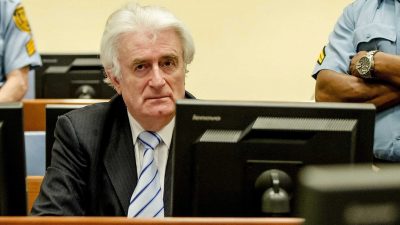By
Rupen Savoulian
The title above is intended to be deliberately provocative, and it is not original either.
It is derived from an article published in the CommonDreams online magazine by Christian Christensen, professor of journalism studies at Stockholm University, entitled “Dear Media: Radovan Karadzic is a European Christian“. Radovan Karadzic was the leader of the breakaway statelet of Republika Srpska, the Bosnian Serb republic that emerged during the Yugoslav civil war of the 1990s. Karadzic and his military forces ethnically cleansed the Serb portions of the Bosnian republic, establishing an ‘ethnically pure’ state for Bosnian Serbs. The Srebrenica massacre, the most infamous mass killings of Bosniaks (Bosnian Muslims) took place on the order of the political and military leadership of the Bosnian Serb republic – that is to say, on the orders of Karadzic.
Professor Christensen notes that Karadzic was convicted of ordering the Srebrenica killings, which amounted to genocide. Karadzic was sentenced to forty years in prison by the International Court of Justice based at The Hague, the Netherlands. While being cleared of charges relating to attacks and killings in other parts of Bosnia where Croatians and Bosnians were killed or driven out, there was no question of Karadzic’s guilt in relation to the Srebrenica killings. Christensen also makes a pointed observation about Karadzic, one that has implications for how we in the English-speaking countries conduct debates about war crimes and terrorism – Karadzic is a white, European Christian.
Karadzic defended himself and his role in the Bosnian conflict as a just, holy war. As Bosnian Muslims were systemically killed and driven out of their historic homes and villages, the forces of the Bosnian Serb statelet described their ethnic cleansing enterprise in terms that conjure up images of the Crusades – mosques destroyed, Muslim cemeteries desecrated. The Serbian Orthodox Church no less, organised a 1996 symposium where, among others, Karadzic made scholarly contributions about how the war for Republika Srpska was a holy war, a continuation of the centuries-old conflict between Christendom and Islam for the soul and territory of Europe. Yet, in the entirety of the conflict, the corporate media in the English-speaking world never described Karadzic as a Christian terrorist, or discussed the role of his religious beliefs in perpetuating the Yugoslav conflict.
The religious affiliations of terrorist offenders is always discussed at great length, with dozens of experts brought in for analysis, when the perpetrators are from Islamic backgrounds. Paris, Brussels – the attacks on European soil are discussed at saturation point by the major media, the suffering of the victims is described in minute detail, and the motivations of the attackers are usually ascribed to ‘something in Islam’. As Ruby Hamad states in her perceptive article:
Yes, the terror attacks by ISIS and similar Islamic extremist groups “have something to do with Islam” in so much as they are committed by groups claiming to act in the name of Islam, but it is deceitful to imply that only Muslims use religion to justify violence. In looking for answers to terrorism in Islam itself, we have already forgotten that Bosnian Serbs and Croatians fought the Balkans civil war with pictures of the Virgin Mary glued to their guns.
In the aftermath of these attacks, Islamic communities are vilified, badgered into denouncing terrorism in all its forms for the umpteenth time. Muslims living in the English-speaking countries are harassed yet again into condemning groups and an ideology with which they have nothing in common. As Professor Christensen points out in his article for Common Dreams:
Yet the European and US media, for the most part, did not (and do not) wish to define Karadzic in terms of his religious affiliation. Many of his victims, however, were certainly framed in that way – they were “Bosnian Muslims.” But the aggressors were usually identified by region and nationality, not religion. This allowed those who live in Europe, or the world, who are not Serbian or Bosnian Serbs to distance themselves. “That’s got nothing to do with me…” is the obvious reaction for those of us from another country or region.
What is wrong with defining Radovan Karadzic as a Christian terrorist? Christensen explains:
When, however, we define people such as Karadzic as “Christian” (and do so on a consistent basis) we enter into an entirely new realm of identity. Any notion of personal connection or collective responsibility moves from region or nation-state to a much broader diaspora of peoples linked simply by their religious faith. Of course, a natural reaction on the part of Christians globally would be to distance themselves from Karadzic, and to claim that his actions have nothing to do with “real” Christians or Christianity.
In other words, Christians would get uncomfortable – or even offended – by the suggestion that they are in any way represented by a monster like Karadzic.
There is no suggestion that all Christians, and the immense diversity of theological and political viewpoints encompassed by Christendom, are in any way represented by Karadzic and his associates. There is no suggestion that Christian priests or practitioners of the faith be badgered to vociferously condemn the crimes of the Bosnian Serb leadership during the 1990s Yugoslav war. What is needed is logical consistency and clarity – the debate about terrorism and crimes against humanity is a distorted, perverse discussion centred on an ethnocentric view of the world.
The nature of political violence, its origins and continuation, needs to be understood as more than just the problem of one religion. The more that we obsessively focus on Islam as the source of the global violence, the less we are able to see that Muslims are also victims of terrorism, and we are less likely to see that Western powers – okay, let’s narrow that down to the United States and the United Kingdom – are themselves the perpetrators of terroristic violence on a global scale. There is an environment of hatred enveloping the UK and the United States, and it has its reflection in Australia. Islamophobic attacks and attitudes are on the rise in Australia, the product of a toxic culture merging fear of terrorism with cultural hostility towards anything Islamic.
There is a backward philosophy, a fundamentalist orthodoxy that is undermining and destroying Australian communities, but it is not Islamism. It is the ideology of free-market fundamentalism, a toxic brew of austerity, cutbacks to social services in the name of budgetary constraints, accompanied by the expansion of private capital into every area of cultural, social and economic life. Communities across Australia are experiencing the social consequences of the closure of factories, businesses and the erosion of social services. As the Australian ruling political and economic elite stumble from crisis to crisis, victims of their own incompetence and myopic Friedmanite vision, it is high time to examine our own economic trajectory as we toboggan towards another intense and shattering financial crisis.



No Comments Yet!
You can be first to comment this post!